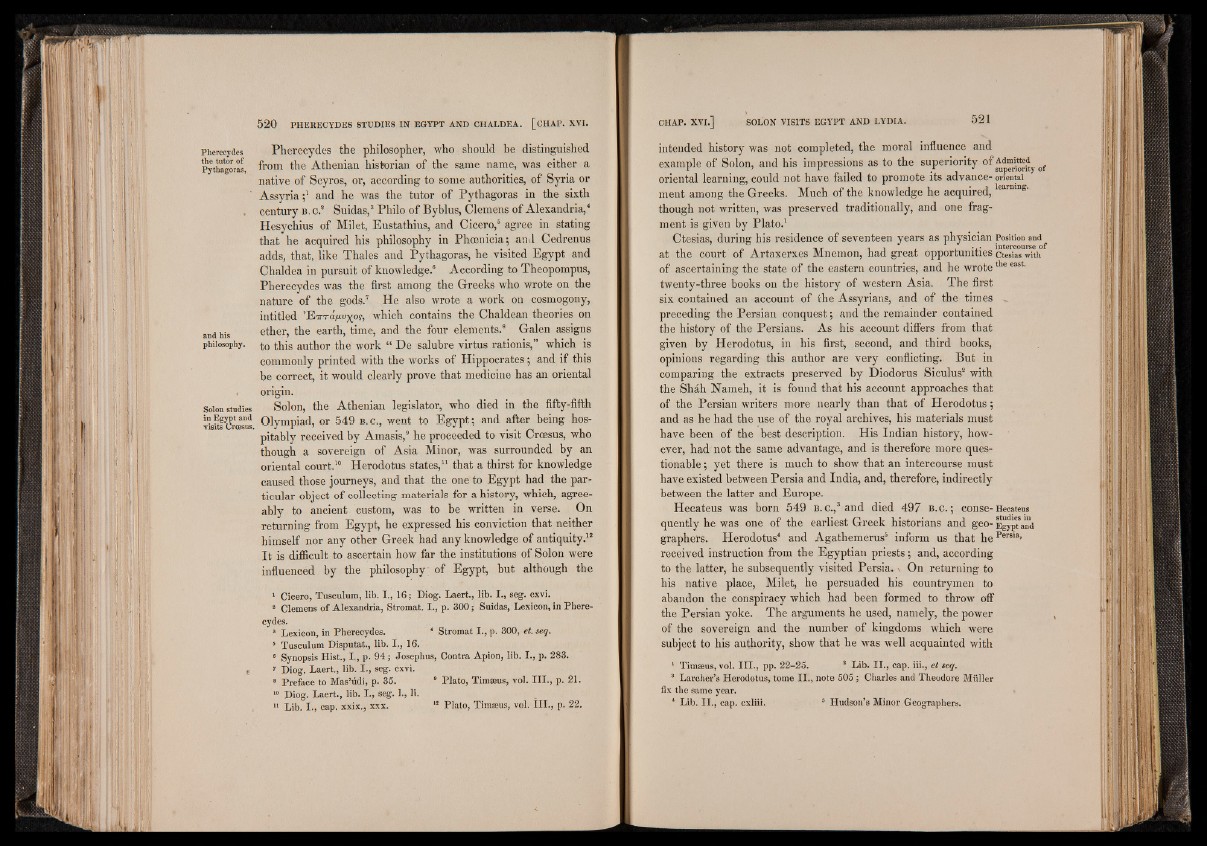
Pherecydes
the tutor of
Pythagoras,
and his
philosophy.
Solon studies
in E gypt and
visits Croesus.
Pherecydes the philosopher, who should be distinguished
from the Athenian historian of the same name, was either a
native of Scyros, or, according to some authorities, of Syria or
Assyria and he was the tutor of Pythagoras in the sixth
century b , c .8 Suidas,3 Philo of Byblus, Clemens of Alexandria,4
Hesychius of Milet, Eustathius, and Cicero,5 agree in stating
that he acquired his philosophy in Phoenicia; and Cedrenus
adds, that, like Thales and Pythagoras, he visited Egypt and
Chaldea in pursuit of knowledge.6 According to Theopompus,
Pherecydes was the first among the Greeks who wrote on the
nature of the gods.7 He also wrote a work on cosmogony,
intitled ’Eirra/tu^or, which contains the Chaldean theories on
ether, the earth, time, and the four elements.8 Galen assigns
to this author the work “ De salubre virtus rationis,” which is
commonly printed with the works of Hippocrates ; and if this
be correct, it would clearly prove that medicine has an oriental
origin.
Solon, the Athenian legislator, who died in the fifty-fifth
Olympiad, or 549 b . c ., went to Egypt; and after being hospitably
received by Amasis,9 he proceeded to visit Croesus, who
though a sovereign of Asia Minor, was surrounded by an
oriental court.10 Herodotus states,11 that a thirst for knowledge
caused those journeys, and that the one to Egypt had the particular
object of collecting materials for a history, which, agreeably
to ancient custom, was to be written in verse. On
returning from Egypt, he expressed his conviction that neither
himself nor any other Greek had any knowledge of antiquity.12
It is difficult to ascertain how far the institutions of Solon were
influenced by the philosophy of Egypt, but although the
I Cicero, Tusculum, lib. I., 16 ; Diog. Laert., lib. I., seg. cxvi.
8 Clemens of A lexandria, Stromat. I ., p. 300 ; Suidas, Lexicon, in Pherecydes.
8 Lexicon, in Pherecydes. * Stromat I., p. 300, et. seq.
3 Tusculum Disputai., lib. I ., 16.
6 Synopsis Hist., I., p. 94 ; Josephus, Contra Apion, lib. I ., p. 283.
7 Diog. Laert., lib. I ., seg. cxvi.
8 Preface to Mas’ddi, p. 36. * Plato, Timseus, Vol. I I I ., p. 21.
10 Diog. Laert., lib. I ., seg. b , li.
II Lib. I ., cap. xxix., xxx. 17 Plato, Timseus, vol. i l l . , p. 22.
intended history was not completed, the moral influence and
example of Solon, and his impressions as to the superiority o f ^mtted^ ^
oriental learning, could not have failed to promote its advance- oriental
ment among the Greeks. Much of the knowledge he acquired, g
though not written, was preserved traditionally, and one fragment
is given by Plato.1
Ctesias, during his residence of seventeen years as physician Position and^
at the court of Artaxerxes Mnemon, had great opportunities ctesias with
of ascertaining the state of the eastern countries, and he wrote1116 east'
twenty-three books on the history of western Asia. The first
six contained an account of the Assyrians, and of the times ^
preceding the Persian conquest; and the remainder contained
the history of the Persians. As his account differs from that
given by Herodotus, in his first, second, and third books,
opinions regarding this author are very conflicting. But in
comparing the extracts preserved by Diodorus Siculus8 with
the Shah Nameh, it is found that his account approaches that
of the Persian writers more nearly than that of Herodotus;
and as he had the use of the royal archives, his materials must
have been of the best description. His Indian history, however,
had not the same advantage, and is therefore more questionable
; yet there is much to show that an intercourse must
have existed between Persia and India, and, therefore, indirectly
between the latter and Europe.
Hecateus was born 549 B.C.,3 and died 497 B.C.; conse-Hecateus
quently he was one of the earliest Greek historians and geo-Egyptami
graphers. Herodotus4 and Agathemerus5 inform us that he Persia>
received instruction from the Egyptian priests; and, according
to the latter, he subsequently visited Persia. \ On returning to
his native place, Milet, he persuaded his countrymen to
abandon the conspiracy which had been formed to throw off
the Persian yoke. The arguments he used, namely, the power
of the sovereign and the number of kingdoms which were
subject to his authority, show that he was well acquainted with
1 Timseus, vol. I I I ., pp. 22-25. 2 Lib. I I ., cap. iii., et seq.
8 Larcher’s Herodotus, tome I I ., note 505 ; Charles and Theodore Muller
fix the same year.
4 Lib. I I ., cap. cxliii. 5 Hudson’s Minor Geographers.